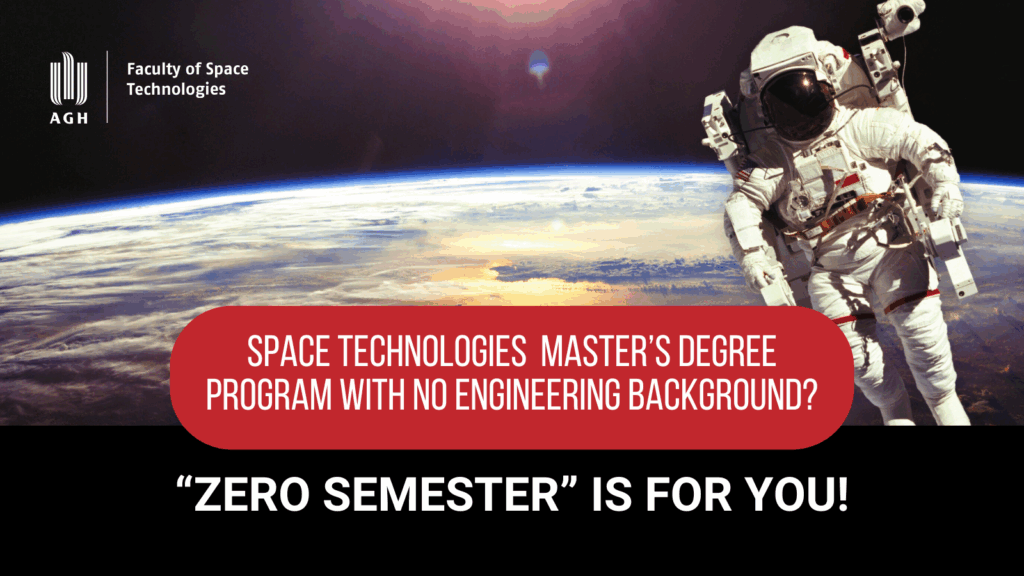Can you study Space Technologies in Poland? Absolutely! Space is closer than you think – and access to education in this field has never been easier.
The master’s program Space Technologies at AGH University of Krakow launched in March this year and was immediately met with high interest. Students are now completing their very first semester.
Space Technologies is a fully English-taught master’s program designed for those who want to build a career in the rapidly expanding space sector – whether they are interested in designing technologies, analyzing and using satellite data, or exploring biomedical technologies. The program is offered at the Faculty of Space Technologies – the first faculty of its kind in Poland!
Thanks to the Zero Semester, even students who hold a bachelor’s degree not related to engineering can apply. Enrolment for the Zero Semester is now open!
What is the Zero Semester?
The Zero Semester is a preparatory course designed to bridge the knowledge gap in mathematics, physics, chemistry, programming, and engineering fundamentals. The curriculum has been developed for those who want to study space technologies but have not previously taken engineering-related courses.
Admission requires passing an entrance exam.
The Zero Semester offers a unique opportunity to reskill and enter one of the most future-forward industries – even if your previous education wasn’t technical or engineering-focused!
Who can apply?
The Zero Semester is open to candidates who:
- have completed a Bachelor’s degree (in any field),
- do not hold an engineering degree but want to continue their education in a technical field,
- have a command of English sufficient to study in the language (all classes are taught in English),
- are ready to commit to an intensive preparatory course and continue their studies in the Space Technologies program.
Space Technologies Master’s Program – What Comes After the Zero Semester?
Upon completing the Zero Semester, students can choose one of the following three specializations:
• Upstream – designing and building space technologies
Focuses on the technologies and systems used in spacecraft design, construction, and operation. Students will learn about orbital mechanics, spacecraft engineering, and onboard systems, gaining the skills necessary to work on the development and testing of space technologies.
• Downstream – analyzing and utilizing data from space missions
This programme concentrates on processing and analyzing data from space missions. The curriculum includes signal processing, remote sensing, and space imagery analysis, as well as the use of machine learning in space applications. Graduates of this programme will be prepared to manage and analyze space data.
• Biomedical – space medicine and life support technologies
Dedicated to those interested in the impact of space on human health and life support technologies in space environments. The program covers space biology, medicine, and biomedical engineering, preparing students to work on life-support systems in space.
International Environment
Courses in the Space Technologies program are conducted entirely in English. In addition to AGH lecturers, students are taught by visiting professors and experts from international institutions, including the European Space Agency (ESA) and the Indian Space Research Organisation (ISRO).
Students study in a truly international environment that reflects the global nature of the space sector. The program is also open to international candidates.
Industry Collaboration
Students will have the opportunity to complete internships at technology and space sector companies that collaborate with the Faculty of Space Technologies.
Thanks to close university–industry cooperation, you’ll gain insight into real career paths from day one. The hands-on experience will make entering the job market much easier after graduation.
Space Student Research Groups – Learning Through Practice
AGH is home to eight active student research groups focused on space topics. Participation in one of them is not only a great way to pursue your passion, but also an integral part of the Space Technologies curriculum.
From the first semester, students engage in real-life projects and work on technologies applied in the space industry.
Project topics are diverse – from building satellites, rockets, and rovers, to experiments on lunar regolith, mission-supporting software, astrobiology, or satellite data analysis.
These activities combine theoretical knowledge with practical skills and promote teamwork.
In many cases, student teams also collaborate with industry partners, gaining valuable experience that’s directly applicable to careers in the space sector.
Important Dates
- First recruitment cycle: June 23 – July 21, 2025
- Entrance exam: July 23, 2025
- Supplementary recruitment: September 1 – 10, 2025
- Entrance exam: September 12, 2025
Useful Links
